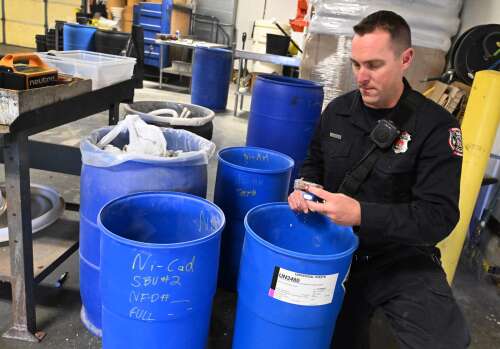Many of the toys and electronic devices that will go under the Christmas tree this year will run on a rechargeable lithium battery. But environmental experts and waste management officials are increasing efforts to ensure consumers know what do with those batteries when they reach the end of their life cycles.
“They aren’t dangerous, but they have the potential to be dangerous,” said Naperville Fire Department Lt. Jared Johnson, who oversees operations of the city’s Household Hazardous Waste facility. “They pose both a real fire hazard and an environmental risk.”
Naperville’s household hazardous waste facility at 156 Fort Hill Drive is one of several around the state funded in part with state grants to handle disposal of an array of items, but with an increasing emphasis on lithium batteries.
Johnson estimates the facility ships out a barrel a week of old lithium and NiCad (nickel cadmium) batteries to a contractor that recycles the elements for reuse and disposes of the packaging.
“That barrel holds 30 gallons, so it’s a high amount of batteries,” he said.
Officials operating the Naperville Household Hazardous Waste facility say they usually fill a 30-gallon drum each week with recyclable lithium batteries.
Paul Valade/[email protected]
SWALCO, the Solid Waste Agency of Lake County, operates a similar site in Gurnee. Executive Director Walter Willis said his agency holds special recycling events throughout the county as well to collect the growing number of recyclable batteries.
“It’s both a safety issue and a resource issue,” he said. “These cause fires on almost a daily basis in waste transfer stations or collection centers and they’re not easy to put out. We’re spending a lot of money because of lithium fires. But these are also recyclable and we should be recirculating that material.”
Naperville Fire Department Lt. Jared Johnson holds a few of the lithium batteries, including cellphone portable chargers, at the Naperville Household Hazardous Waste facility.
Paul Valade/[email protected]
Illinois is on the precipice of becoming the national leader in battery collection and recycling thanks to a $2 million matching grant from the U.S. Department of Energy, according to Illinois Environmental Protection Agency acting director James Jennings.
“Compared to some other states, we are much further along already,” he said. “But soon, we’re going to have a first-of-its-kind program that puts us in a position to have the most robust battery recycling battery program in the country.”
The goal is to have a recycling location for each of the state’s 102 counties, Jennings said, as well as a drop-off location in towns with populations of 10,000 residents or more.
Additionally, the program will eventually be taken over by battery manufacturers. A new law was passed last year requiring manufacturers to handle collection responsibilities within the next few years. Because of the recyclable value of the lithium and NiCad batteries, it’s something the manufacturers are willing to do, officials said.
Meanwhile, many other locations across the state also accept old lithium batteries, including many big box hardware stores like Lowe’s and Home Depot.
Call2Recycle is one of the nation’s largest private recycling service providers. Visitors to the company’s website, call2recycle.org can find participating stores nearby that collect old lithium batteries as well.
Lithium batteries can be dropped off on weekends at the Naperville Household Hazardous Waste facility at 156 Fort Hill Drive in Naperville.
Paul Valade/[email protected]
